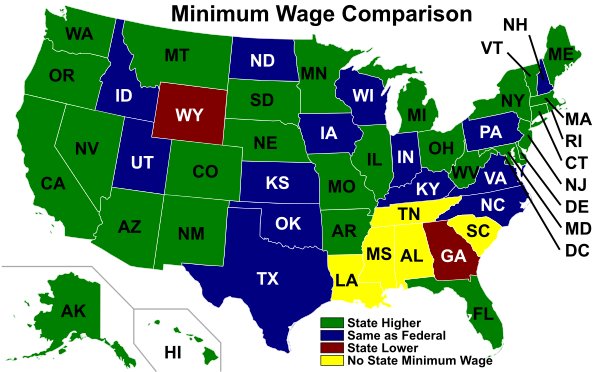Stop stigmatizing minimum wage workers

With so many states setting minimum wage requirements, it is important to remember to respect the minimum wage worker.
It was the end of a typical school day; I found all my friends, and we went across the street to buy drinks. After entering the air-conditioned haven of Tea Station and placing our orders, we began to taste our drinks. Mine was a safe play, but one girl’s tea was too sweet for her. She started to complain about the employee who had made it, telling us that he was not even qualified for his job. I laughed and agreed, but began to think about her comments.
Earning minimum wage is often associated with a “job” and not with a “career.” It’s the pimple-faced teenager who works part-time or the college student who does it for a little pocket money, not a 40-year-old mother trying to support her family.
However, according to the U.S. Bureau of Labor Statistics, 80 percent of minimum wage workers are older than 25, and over 70 percent work full time.
For us teenagers, living in the Silicon Valley and attending such a high-achieving school like Harker, the norm for us is to enter a brand-name school and then take a financially stable career path. Not even an inkling of a thought exists about working in, say, the fast food industry.
The environment we’ve grown up in has generated preconceived notions of success such as a six-figure salary (or seven-figure for that matter), a fancy car or designer clothes. So when we walk into a fast-food restaurant and see middle-aged people working there, the first thought that often pops into our minds is “What did they do to end up here?”
Whether or not that is a passing thought, we subconsciously begin to doubt these employees’ abilities to perform. We unrealistically expect everything to be performed to a previously-set standard, but we have to take a moment to realize that that is impossible. These working environments are dynamic and susceptible to a number of changes that we as customers are usually not privy to.
“The customers are sometimes a bit demanding, and the employee doesn’t have that kind of power to do what they’re asking for,” said Medha Shah (10), who sometimes works as a cashier or busser for her family’s cafe.
Minimum wage employees don’t hold the power to speed up our order or change a policy we don’t like. So why do we act like the reason the service we are receiving doesn’t match up with our expectation is entirely their fault?
Recent plans to increase the minimum wage in Palo Alto and San Francisco to fifteen dollars are steps in the right direction for these workers. The current federal minimum wage of seven dollars and twenty five cents amounts to a yearly salary of only fifteen thousand dollars. Families of two or more live below the poverty line on this income. Increasing the minimum wage will not only improve the lives of minimum wage workers, but also those whose salaries are near the minimum wage.
Just because one person is a cashier at a grocery store and someone else is a lawyer doesn’t change the fact that they are both humans and both have the same rights. No matter what station in life we occupy, every human being still deserves the same amount of respect as the next.
This piece was originally published in the pages of The Winged Post on May 13, 2015.

Kaitlin Hsu (11) is the Editor-in-Chief of Wingspan Magazine. In her freshmen year, she was a reporter, and in her sophomore year, she was the Features...


















![“[Building nerf blasters] became this outlet of creativity for me that hasn't been matched by anything else. The process [of] making a build complete to your desire is such a painstakingly difficult process, but I've had to learn from [the skills needed from] soldering to proper painting. There's so many different options for everything, if you think about it, it exists. The best part is [that] if it doesn't exist, you can build it yourself," Ishaan Parate said.](https://harkeraquila.com/wp-content/uploads/2022/08/DSC_8149-900x604.jpg)




![“When I came into high school, I was ready to be a follower. But DECA was a game changer for me. It helped me overcome my fear of public speaking, and it's played such a major role in who I've become today. To be able to successfully lead a chapter of 150 students, an officer team and be one of the upperclassmen I once really admired is something I'm [really] proud of,” Anvitha Tummala ('21) said.](https://harkeraquila.com/wp-content/uploads/2021/07/Screen-Shot-2021-07-25-at-9.50.05-AM-900x594.png)







![“I think getting up in the morning and having a sense of purpose [is exciting]. I think without a certain amount of drive, life is kind of obsolete and mundane, and I think having that every single day is what makes each day unique and kind of makes life exciting,” Neymika Jain (12) said.](https://harkeraquila.com/wp-content/uploads/2017/06/Screen-Shot-2017-06-03-at-4.54.16-PM.png)








![“My slogan is ‘slow feet, don’t eat, and I’m hungry.’ You need to run fast to get where you are–you aren't going to get those championships if you aren't fast,” Angel Cervantes (12) said. “I want to do well in school on my tests and in track and win championships for my team. I live by that, [and] I can do that anywhere: in the classroom or on the field.”](https://harkeraquila.com/wp-content/uploads/2018/06/DSC5146-900x601.jpg)
![“[Volleyball has] taught me how to fall correctly, and another thing it taught is that you don’t have to be the best at something to be good at it. If you just hit the ball in a smart way, then it still scores points and you’re good at it. You could be a background player and still make a much bigger impact on the team than you would think,” Anya Gert (’20) said.](https://harkeraquila.com/wp-content/uploads/2020/06/AnnaGert_JinTuan_HoHPhotoEdited-600x900.jpeg)

![“I'm not nearly there yet, but [my confidence has] definitely been getting better since I was pretty shy and timid coming into Harker my freshman year. I know that there's a lot of people that are really confident in what they do, and I really admire them. Everyone's so driven and that has really pushed me to kind of try to find my own place in high school and be more confident,” Alyssa Huang (’20) said.](https://harkeraquila.com/wp-content/uploads/2020/06/AlyssaHuang_EmilyChen_HoHPhoto-900x749.jpeg)


